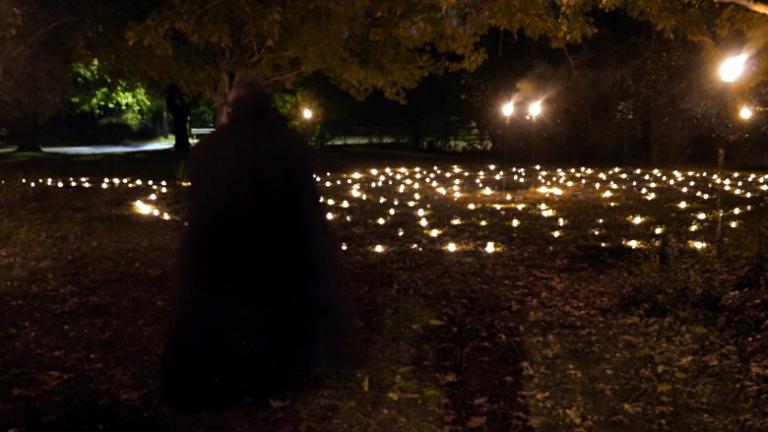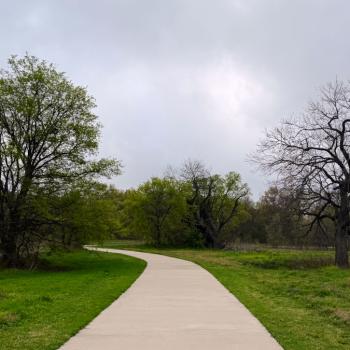A local friend (who prefers to remain anonymous) sent me a question:
Today I was listening to a podcast where they mentioned a recent incident of a metaphysical shop in Pennsylvania where the police came in to remind the proprietor about an anti-fortune telling law still on the books [here’s a link to the Wild Hunt story on that incident]. One presenter on the show talked about how a recent order his wife placed at a bakery was rejected at the last minute because of the nature of her business.
So, my question is, what do we do if society becomes less friendly to folks like us?
On one hand, the United States is the most religiously diverse and religiously tolerant society in the history of humanity. My workplace includes Christians, Hindus, Muslims, Jews, atheists, and at least one Pagan. We all get along just fine. I’ve been leading public rituals – in Texas – for 20 years and I’ve never had a problem with any of it. It’s not just me – each generation is more open and accepting than the last when it comes to religion, culture, sexuality and gender, and pretty much everything else.
On the other hand, being a religious minority always comes with risks and it only takes one aggressive bigot to ruin your day… or to ruin much more. Whatever your thoughts on the horrible events in Israel and Palestine, there are no excuses for attacks – physical or verbal – on American Jews, or on Jewish people anywhere. Nor are there excuses for attacks on Muslims.
Of specific concern to Pagans and witches are the Christian nationalists who make baseless claims that this is a “Christian nation” and who want to turn it into a white Protestant Christian theocracy. These people are politically active and many of them have made their way into positions of power in local governments. This is why we have to vote in every election in every race, especially for things like school boards. We can’t ignore them and hope they’ll go away – that’s how they’ve been able to get power far in excess of their numbers. They’re happy to use archaic and obsolete laws – such as the one in Pennsylvania – to force people to conform to their religion-based morality. And because they and their allies have taken control of the courts, what should be a simple appeal to reason and justice is often impossible.
See things as they are
As always, it is essential that we see things as they actually are. We cannot allow ourselves to be paralyzed by fear. Neither can we ignore threats that may escalate – locally, nationally, or worldwide – at any time.
For the most part, we can be Pagans and witches, Druids and Heathens, polytheists and pantheists, and all that involves to whatever degree we desire and to whatever degree we’re called. Two years ago USA Today quoted Jason Mankey saying “we’re in the middle of a witch moment.” That moment is still going on and it isn’t likely to be over any time soon.
At the same time, we need to pay attention to our environment and be ready if a situation gets out of hand – if society really does become “less friendly” to Pagans and witches.
Take care of ourselves
By “take care of ourselves” I mean mundane street safety and mental health and everything in between.
Before the first public ritual I led, I came up with a plan for what to do if someone showed up to disrupt it… or worse. That was 20 years ago. I’ve never needed that plan, but it’s there if I ever do. It’s just like walking in an unfamiliar city: who’s around me, are there any potential threats, and how can I respond if I have to?
Beyond that, there’s the question of what’s worth fighting over. As a straight white cis man I don’t face the subtle (and sometimes not subtle) discrimination many of my friends do. But there have been times I’ve been in places where it was clear I wasn’t welcome. I went somewhere else.
That doesn’t justify unwelcoming behavior – much less violating equal accommodations laws – and the bigots who tell LGBTQ people “there are plenty of other wedding cake bakers who would be happy to have your business” are legally and ethically wrong. It does mean my resources are limited and I’m going to spend them where I think they’ll do the most good, not in responding to people who enjoy making me angry.
It may mean moving to a more friendly location. I always thought I’d be in Texas forever, but it’s become too big of a drain on my mental health. As soon as I can retire, I’m out of here.
If you’re up for a fight, take it on. If you’re not, then do what you can to make things better without becoming a martyr. Take care of yourself.
Work to repeal unjust laws
The Pennsylvania law in question is intended to protect the public from fraud. Every so often we’ll see cases of someone who convinces a gullible person that they’re cursed and will offer to remove the curse – for a price. A reading turns into magical working turns into a major ritual and the victim has spent thousands of dollars to remove a curse that in almost every case wasn’t there to begin with. This is fraud, and no special laws are required to prosecute it.
For all its problems, Texas law gets this right. There are no state laws against fortune telling – just against fraud.
A client who pays for divination understands what they’re buying. When the reader delivers an honest reading, a fair transaction is completed.
It does not take an advanced degree in constitutional law to understand that while the Pennsylvania law was passed with good intentions, it makes religious and spiritual assumptions that cannot be substantiated (namely, that all divination is fraud). It does not apply to ordinary divination because there is no fraud, and the assumption that it does is religiously discriminatory.
Unfortunately, the police chief in question takes the position that “the law is the law” and vows to enforce it. He’s “just following orders.”
Given the conservative takeover of the courts, judicial relief is unlikely.
And so we do what we must do. Namely, petition legislators to repeal the law in question, and keep pestering them about it until they do.
This shouldn’t be necessary. But it is, so we do what we have to do.
Insist on our full rights under the law
We’re in a difficult situation when the law is against us. But when the law is on our side – as it is when it comes to equal opportunity in public accommodations – we must aggressively assert and defend our rights.
At the least, this means understanding our rights and being able to articulate them clearly, succinctly, and accurately. Screaming “that’s discrimination!” rarely accomplishes much. Being able to calmly cite the precise law such actions violate carries much more weight. Bigots don’t care that something isn’t fair. They care that they could be prosecuted or sued for violating a law.
At some point, though, laws have to be enforced – and enforcement costs money. The ACLU does not have a bank of lawyers just waiting to take your case on a pro bono basis. If you have the resources to pursue legal enforcement – time as well as money – please do.
Still, the court of public opinion can often do what courts of law will not. There’s a reason why homophobic wedding service providers rarely post “we serve straight couples only” signs – it would cost them too much business from people who would never patronize them if they knew.
That doesn’t always work – some bigots love their bigotry more than they love their business. But there are ways to insist on your legal rights even if you can’t access the courts.
Make alliances with other people of good will
We don’t have to do this alone. We can’t do it alone. And so we join together with other people of good will to build a better world.
This is one of the main reasons I’m a Unitarian Universalist. Most UUs don’t share my beliefs, but they do share my values. They support me in my free and responsible search for meaning and truth, and I support them in theirs. Most of my family are mainline Protestants. We don’t agree on the number of Gods, but we do agree that we should treat other people with dignity and respect.
Religiously, politically, and socially, there are people who share our values. Let’s find them and work with them where ever we can.
We do what witches have always done
For centuries, people have feared and persecuted witches – and people thought to be witches – because witches could not be controlled. Witches are people who work unauthorized magic, who live life their own way, who do as they will and not as they’re told.
The witch stands in opposition to the mainstream world and to its values.
If society becomes less friendly to witches and Pagans, then we will continue doing what we do in private, in secret, deep in the forest and behind closed doors, behind passwords that for all their metaphorical meaning have the practical value of letting us know who we can trust with our magic and who we can’t.
There are some in our community who think we should be doing that now. I don’t agree – I think we need to be as “out” as possible (with the full understanding that some people can’t). Some mysteries must be preserved for the proper times and places, but worshipping the many Gods and working magic is something we need to normalize as much as we can.
But if we can’t do it in public, then we will continue to do it in private. Because it’s part of who and what we are, and we can’t not do it.
And if we happen to hex a few regressive and fascist politicians in the process, so much the better.




















